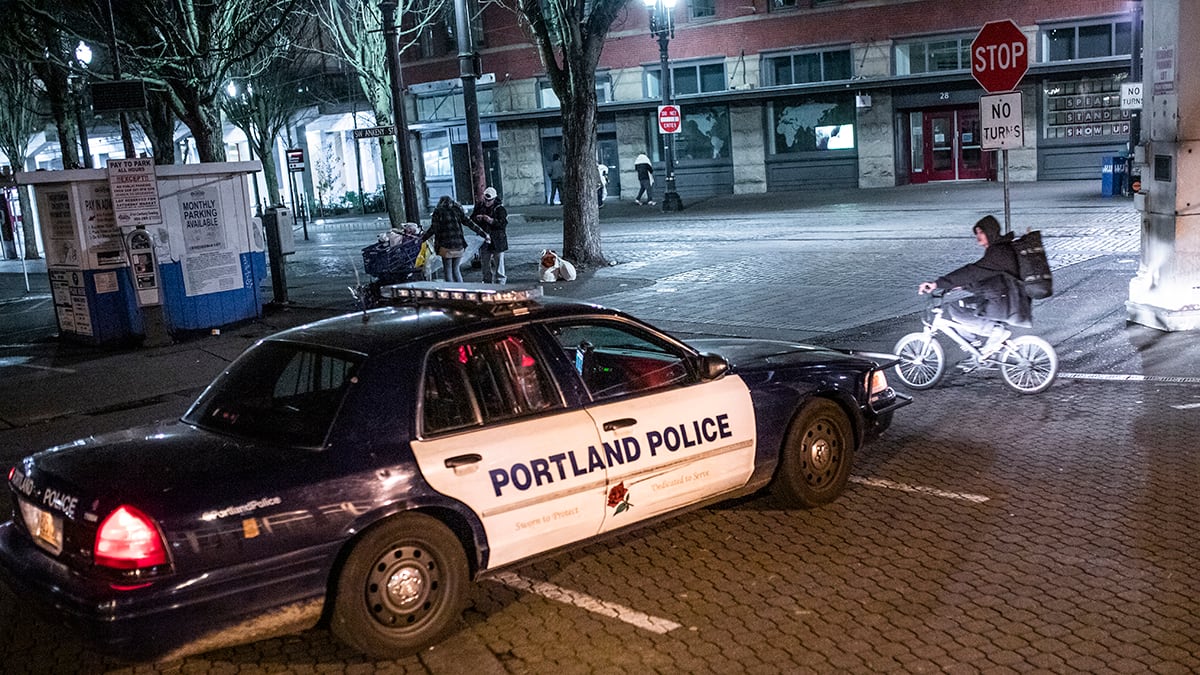The Portland City Council took what might look like a baby step last week toward more efficient handling of non-emergency 911 calls.
In a break from current practice, in which uniformed, armed police officers in squad cars or a truckload of firefighters respond, commissioners approved a pilot project in which a new "third branch" of the first-responder system, staffed by a specially trained firefighter and a contracted crisis worker, would respond to some non-emergency situations.
The program starts with just one two-person team.
Commissioner Jo Ann Hardesty, architect of the two-responder pilot project, called Portland Street Response, framed it as a much bigger deal.
"This is revolutionary," Hardesty said. "We have not changed our first-response system since the late 1800s."
Police officers and firefighters agree it's significant, but not in a way they like.
In fact, they find the new program so threatening, WW has learned, the police and firefighters' unions took the unusual step of trying to block the Nov. 21 council vote—and threatened legal action if the council did move forward.
"This pilot program is expressly intended to transfer [emergency medical service] bargaining unit work from the Portland Firefighters Association bargaining unit to 'crisis workers' outside our unit," wrote Barbara Diamond, an attorney for the PFFA, in a Nov. 20 letter to the city's labor relations manager, copying Hardesty and the city attorney.
The Portland Police Association also raised objections through its attorney in September and October emails, demanding the city enter into bargaining because Portland Street Response, which is slated to serve part of the Lents neighborhood, jeopardized the status quo.
Last week, on the eve of the council vote, Sgt. Daryl Turner, president of the Portland Police Association, broadcast the union's opposition.
"Part of the Street Response project is built on a false premise and perception that Portland police officers are ill-suited to address mental health and homelessness issues in a constructive and safe manner," Turner said in a Nov. 20 statement. "Nothing could be further from the truth."
The full import of Turner's press release was unclear at the time. But documents WW obtained through a public records request since then show public safety unions will fight any incursion on their turf.

Portland Street Response will serve two purposes: deal with the vast number of 911 calls related to homelessness, addiction or mental illness; and acknowledge looming financial challenges.
As Hardesty noted, public safety bureaus have changed little over time. But in recent years, their work has changed dramatically.
Last year, for instance, records show Portland Fire & Rescue responded to more than 87,000 calls for service. Just 664 of those calls were to report "structure fires" in which homes or other buildings were ablaze. That's fewer than 1 percent of calls.
Similarly, the Portland Police Bureau responded to about 262,000 calls in the past year. Most did not result from a serious crime; instead, they involved homelessness, mental illness or addiction.
In February, WW reported that the most common reason Portlanders called 911 was to report "unwanted persons"—that is, people trespassing or camping on private property ("What's Your Emergency?," WW, Feb. 9, 2019).
Call volume for both bureaus has grown much faster than staffing, leaving first responders feeling overworked and under supported by City Hall.
One solution is to shift responsibility for non-emergency 911 calls to two-member teams specifically trained to work with people dealing with homelessness, mental illness or addiction, rather than to fight crime or fires.
That's what a 30-year-old program in Eugene, called Crisis Assistance Helping Out on the Streets, has been doing. Last year, CAHOOTS handled 25,000 non-emergency calls, sending unarmed, non-uniformed civilians to respond.
That private nonprofit model offers a sense of where Portland could go, a possibility not lost on unions here.
"We have fear, absolutely, that they want to reduce our staffing to pay for other things," says Jason Lehman, vice president of the firefighters' union. "We are absolutely not in favor of that."
When Tom Rinehart, the city's chief administrative officer, explained the policy behind Portland Street Response last week, he cited a need to "reimagine how we allocate public safety resources."
The budget realities are stark: Although fires are rare and crime is in a decadeslong decline, public safety budgets consume most of the city's general fund dollars—53 percent last year, up from 49 percent a decade ago.
In its Nov. 20 letter, the firefighters' union said it was filing an unfair labor practice complaint and pushed for a city response.
"The union demands that the status quo be maintained pending any lawful negotiations," the letter said.
"The city is evaluating the demands and will fulfill any obligation to bargain in good faith," says City Attorney Tracy Reeve.
But Mayor Ted Wheeler, who worked with Hardesty to launch Portland Street Response, says it's the future. He complimented the work of police and firefighters last week, but his enthusiasm for the program signals he is prepared to lock horns with public safety unions as he enters an election cycle.
"As our community's needs change, so too must our response to those needs," Wheeler tells WW. "The Portland Street Response program represents a common-sense solution for addressing the needs of people who are in crisis on the streets, especially when criminal activity is not involved."

